Thursday, May 4, 2023
A Loaf of Bread
It came and went on the spring equinox and I missed it, but I’ll save it for next year: National French Bread Day, celebrated on the 21st of March. Who knew? (Evidently a lot of people, enough to warrant many sites on the internet.)
But there’s plenty of time to catch National Homemade Bread Day on the 17th of November. Baking bread fills the house with a delightful aroma; therefore, November is the ideal time to add bread-making to one’s routine. Break it, right out of the oven, and slather it with butter. (Not margarine; never margarine! Homemade bread deserves the luxury of real butter. Artisan butter, direct from a local dairy, if you can afford it.) Serve it with those winter stews.
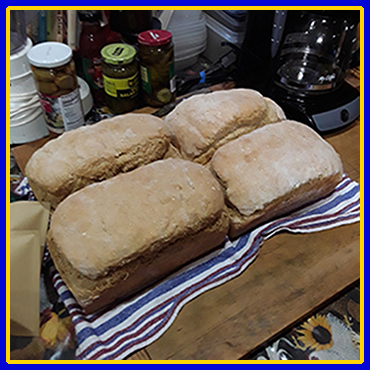 I have posted my own bread here on occasion. For many years I have made bread during the holidays, to give as gifts. It’s always the right color and the right size, and it doesn’t last long enough to collect dust. I make it when snow is predicted, too, for neighbors who help me move the stuff. I have come to measure how much a snow storm dumps by the number of loaves I hand out – a one-loafer, a two-loafer, or a three-loafer.
I have posted my own bread here on occasion. For many years I have made bread during the holidays, to give as gifts. It’s always the right color and the right size, and it doesn’t last long enough to collect dust. I make it when snow is predicted, too, for neighbors who help me move the stuff. I have come to measure how much a snow storm dumps by the number of loaves I hand out – a one-loafer, a two-loafer, or a three-loafer.
Not the loafers pictured below. Nothing tops the comfort and warmth of these slippers, while you enjoy your fresh bread and hearty stew:
 A couple of years ago, when working from home became the “thing,” I realized that being home all the time meant I could make bread for ME, too. So now I make four loaves every month, keep one for the week and store the other three in the freezer at church. (There’s no room in our home freezer.) It’s no trouble to fetch a new loaf every Sunday after service.
A couple of years ago, when working from home became the “thing,” I realized that being home all the time meant I could make bread for ME, too. So now I make four loaves every month, keep one for the week and store the other three in the freezer at church. (There’s no room in our home freezer.) It’s no trouble to fetch a new loaf every Sunday after service.
There’s nothing like my oatmeal bread for breakfast every morning, toasted, with Teddie peanut butter (all-natural, unsalted – just peanuts). I must have died and gone to heaven!
To Tease Your Mind
We who lived in concentration camps can remember
the men who walked through the huts comforting others,
giving away their last piece of bread.
They may have been few in number,
but they offered sufficient proof that everything
can be taken from a man but one thing:
the last of the human freedoms –
to choose one’s attitude in any given set of circumstances,
to choose one’s own way.

Viktor Frankl
(26 Mar 1905 – September 2, 1997)
Jewish-Austrian psychiatrist who founded logotherapy,
a school of psychotherapy that describes
a search for a life’s meaning
as the central human motivational force
This issue’s book review is on a book by another man – Heinrich E. Jacob – who spent a year in a concentration camp. He barely survived on the Nazis’ concept of the “bread” fit to feed Jews. Its main ingredient was sawdust, often “fortified” (Wonder Bread’s unique feature) with sand and other indigestibles.
A Book Worth Checking Out
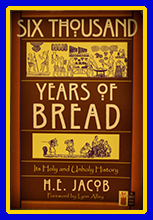 Six Thousand Years of Bread: Its Holy and Unholy History (1944)
Six Thousand Years of Bread: Its Holy and Unholy History (1944)
H. E. Jacob
“Yeast, water, flour, and heat. How could this simple mixture have been the cause of war and plague, celebration and victory, supernatural vision and more? In this remarkable and all-encompassing volume, H. E. Jacob takes us through six thousand dynamic years of bread’s role in politics, religion, technology, and beyond. Who were the first bakers? Why were bakers distrusted during the Middle Ages? How did bread cause Napoleon’s defeat? Why were people buried with bread? Six Thousand Years of Bread has the answers.
“Jacob follows the story from its beginning in ancient Egypt and continues through to modern times. The poignant and inspiring conclusion of the book relays the author’s experiences in a Nazi concentration camp, subsisting on bread made of sawdust.”
After surviving a Nazi concentration camp, Jacob no doubt really understood how to appreciate good bread. He had begun work on the book in the 1930s, and when in 1938 he was sent to the concentration camps, first at Dachau then at Buchenwald (where he received bread made of sawdust!), his wife Dora hid the manuscript to keep it out of Nazi hands. Jacob was well-known as a writer, and the Nazis had banned his publications in 1933. Dora reached out to an uncle of Jacob’s, an American citizen, to sponsor Jacob’s bid for citizenship. Jacob was released a year later and he immediately fled to the U.S., where he resumed his research and published the book in 1944, when the world was still wracked by WWII.
It didn’t take me long to digest this book about bread (if you’ll excuse the play on words). It had much to teach me or, more accurately, to remind me. I read the book 45 years ago, and the memory of it napped in a corner of my mind ever since.
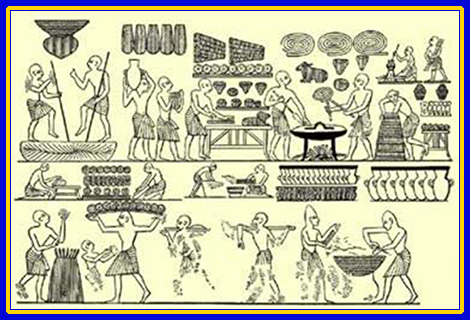 Egyptians making bread
Egyptians making bread
The Egyptians taught the Jews (Hebrews/Israelites) how to make flour from wheat and to bake leavened bread. Previous to the arrival of the Israelites in Egypt (invited by Joseph when famine stalked the region), they were a nomadic people, never staying anywhere long enough to do anything more with their grains than gather it from fields, mix it with seeds and fruit and nuts, and bake it as small, dense cakes on hot stones. They were not an agricultural people.
In Egypt, however, they were stationary enough to learn about flour-based breads. The Egyptians taught them how to plant grains – wheat, millet, barley, and others – how to grind the grain into flour, how to capture wild yeast spores from the air that would raise bread dough, and how to build ovens to bake it.
Four hundred and thirty years later, when Moses led them out of Egypt and out from under the rule of Pharaoh, they returned to a nomadic state, but only for forty years. They may not have made much leavened bread during these travels, but they retained the memory, and put it to use when they once again settled, this time in the Promised Land.
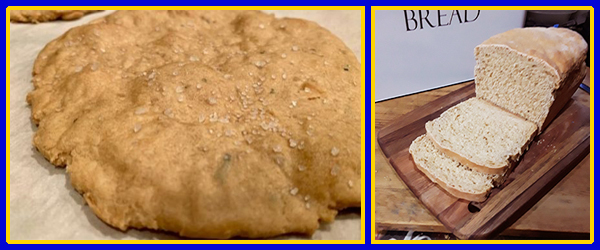 unleavened bread leavened bread
unleavened bread leavened bread
Religious, cultural, and economic influences created some odd inconsistencies in the attitude of the Israelites toward bread. They recognized that the yeast was a form of fermentation, and they deemed that a form of corruption. Therefore, offering leavened bread at religious ceremonies was an insult to God. But they didn’t see the leavened bread as too corrupt to eat at any other time. Some state, too, that the Israelites left Egypt so suddenly, they didn’t have time to bake bread, so during their forty-year trek in the desert, they returned to the traditional unleavened seed-and-grain cakes, more suitable for travel, cooked on a stone at an open fire.
This book dives deep into the history of bread. It covers facets that most of us would never think of, but which were linked to every feature in the development of the Western world. Whether or not you bake bread or eat it, you will find this a fascinating, low-carb read.
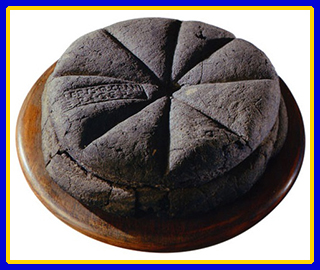
Preserved (carbonized) loaf of bread discovered when digging out Pompeii,
the Roman town buried in volcanic ash in 79 AD when Mount Vesuvius erupted.
The baker’s trademark is visible on the left-hand piece.
Another Loaf
I was definitely distracted around the holidays in December. My beady little brain kept tickling me that I’d forgotten something. Over a month later, I made the connection: I had forgotten to make bread for the police department! Horrors! Immediately I set bread to rise in the giant pot, and delivered it when it was barely cooled.
For several years as a holiday treat, I have delivered my bread, sliced, with a tub of whipped butter, to the local constabulary. A separate loaf is delivered to my friend on the force, Lt. Scott, who served as an SME – subject-matter expert – during my writing of “The Sturgeon’s Dance.” He enjoyed his role as a consultant, examining those scenes involving police activity for accurate depiction and giving me pointers.
Early in our relationship, he and I colluded over disposal and consumption of the bread. Here follows The Great Oatmeal Bread Conspiracy.
Monday, December 23, 2019, 8:23 am
From: Sally To: Lt. Scott
Subject: oatmeal bread
Dear Lt. Scott,
Be sure to get yourself to the department’s kitchen and snaffle a piece of bread! I brought in two loaves this morning, with butter, for you folks.
Enjoy! And Merry Christmas!
9:40 am from Lt. Scott
Fantastic, thank you. Last year I stole a few extra pieces to bring home
– the bread was great for toasting!
Have a great Christmas.
9:55 am from Sally
It is the best for toast, especially with peanut butter!
I’ll be making more on Saturday. (This is my primary Christmas gift to friends and neighbors – it’s always the right color and it always fits.) I would love to provide you with a whole loaf for your family. Let me know when and where, and I’ll smuggle a loaf out of the house for you.
Merry Christmas to you, too!
10:24 am from Lt. Scott
Thank you, but don’t put yourself out – I’ll eyeball the kitchen downstairs and may be able to snaffle most of a loaf from what you brought by. There’s a lot of food here and many of the guys and gals grab the junk food. They may not miss one of the two loaves you dropped off! People are very generous this time of year and I hate seeing food that people made for us go to waste. So, if grabbing one of your breads is helping everyone by not letting food go stale, then I’m happy to make the sacrifice and do my part!
10:48 am from Sally
Like I tell every police officer, support personnel, active and veteran military service member: thank you for your sacrifice. It’s not always easy.
Don’t worry about me making more bread. It’s no trouble, since I’m making it anyway. My oven can handle four loaves at a time. In winter, I try to have a couple of loaves ready-made to give to anyone in the neighborhood who helps me move snow after a storm. It’s useful collateral in lieu of payment.
A couple of years ago, Phillip and I were headed out one morning for a paid gig he was doing as Lincoln, and it had snowed in the night, about five inches of light, fluffy stuff. It wasn’t enough to keep us from getting out of the yard with Phillip’s four-wheel-drive SUV, so I wasn’t going to bother with shoveling. I stepped out the door and spotted a young man with his back to me, shoveling away at our walkway. I didn’t recognize him until he turned around. It was the not-so-little boy from across the street. He had grown about six inches since I’d last seen him.
I thanked him for his work and told him that we were headed out for the day, but that I’d pay him when we got back. He hung his head shyly and shook it, and said, “No, no money.” “How about if I make you some bread instead?” He beamed at me and said, “I was hoping you’d say that!”
In any case, come day’s end, let me know if the bread is all gone. I’ll be mad at you if I find out you didn’t get to take any home and then didn’t tell me. This stuff is too good NOT to spread the wealth!
2:35 pm from Lt. Scott
Mission accomplished. I was able to get a whole loaf out to bring home.
We’re having my family over on Christmas morning, so this will help feed everyone. Picking it up, I forgot how dense the bread is – perfect.
I could exist on bread, so this won’t go to waste. Thanks again and have a great Christmas.
2:46 pm from Sally
Good! Sometimes it’s a benefit when some people just don’t know enough to appreciate the good things in life. (Who needs more sweets and pastries? If we aren’t already sick of them by now, we soon will. My birthday comes right after New Year’s Day, and I’ve spent most of my adult life celebrating months later, when I can once again bear to look at something sweet.)
I find myself conflicted, however, about my role in aiding and abetting a police officer to steal bread. Weren’t the peasants beheaded for that during the French Revolution?
2:49 pm from Lt. Scott
You’re deep into the conspiracy already, so there’s no turning back now…
3:05 pm from Sally
You have provided good counsel in the past, so I shall accept more – or is my involvement in the conspiracy a verdict?
6:11 pm from Lt. Scott
Ha ha! I have your email saying you wanted me to have a loaf of the bread.
I’d say that covers both of us from any convictions. Hopefully.
Or implicates us both …
6:26 pm from Sally
Well, if we must serve time for our transgressions, perhaps the warden will let me cook, so we can eat oatmeal bread every day behind bars. We might get time off for good behavior, or at least for good bread. I’ll be happy to share it with the warden and the guards. (I’m not above bribery).
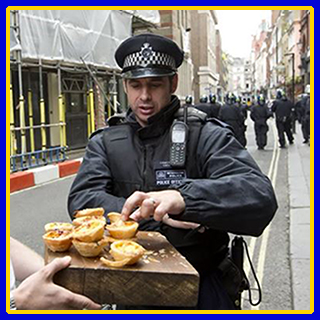
The loaf crumbles under the weight of more silliness:
Curly Howard, in an episode of the Three Stooges, once said that he’d quit his job. When Moe asked why, Curly quipped, “I got sick of the dough and thought I’d go on the loaf.” In another episode, he sings. “She was bred in old Kentucky, but she’s only a crumb up here.”

Calendar & Announcements
Events have come and gone. Nothing is lined up for the near future.
Past events:
February 26, 2023 – Authors at the Vineyard
Zorvino Vineyards in Sandown, NH
Organized by New England Author Expo
https://newenglandauthorsexpo.com/
This venue is very attractive, and about 20 of us were set up throughout the vineyard’s function room. It snowed off and on (mostly on) all day, but not enough to accumulate. A decent turnout of visitors. It was a nice time to catch up with old friends, and a fellow I used to work with showed up with his wife to say hello – we hadn’t seen each other since everything shut down in March 202 and the company sent us all home with laptops to work.
April 22, 2023 – Wicked Smaht Spring Festival
The Common in North Andover, MA
Organized by Amanda Marie, Wicked Smaht Wellness
https://www.wickedsmahtwellness.vip/
About a dozen local vendors gathered on the common to celebrate Earth Day, including a coffee truck (very popular in the cool, damp-ish air, though it didn’t rain) and musical groups who performed over the course of the afternoon. I participated in the open-mic sessions, reading an excerpt from my first novel, Bead of Sand. Folks were having fun, as well as the dogs who brought their people, too.
April 29, 2023 – Independent Bookstore Day/Inaugural Indie Author Day
Molly’s Bookstore, Melrose, MA
Organized by Andrea, owner of Molly’s Bookstore
https://mollysbookstore.com/
This is a brand-new site in downtown Melrose, in a bright, airy space. Entry is at street level and the lower level features children’s books and activity tables. Andrea invited thirteen local authors to exhibit their books, setting us up under tents in the back parking lot. Cookie Monstah showed up with ice cream cookie sandwiches, which was popular despite the rawness and on-and-off rain. The genres were wide spread among us authors – adult fiction, children’s books, science, fantasy, literary fiction, memoir, mystery, and others.
Senior Writing Programs
Wakefield Senior Center, Wakefield, MA
Colleen Getty, Founder, The Room to Write
https://www.theroomtowrite.org/
Since June 2022, four of us local writers – Colleen Getty, Kathy Shine Cain, and myself, with Linda Malcolm coordinating it all – have been facilitating senior and veteran writing programming. It has resonated strongly in the community, with a lot of local seniors becoming regulars. Much of the time, our weekly “write-ins” are open to anyone and anything they want to write, with us providing prompts to stimulate the creative juices. About once per quarter, we dedicate three or four weeks to a workshop on specific topic or task, like memoir writing and revision. This month’s focus is on writing short biographies for one another. We’re having great fun, and you wouldn’t believe the power of the stories that these men and women have to tell.
Conversations
Do you have comments or questions about this post?
I’d love to hear them. Let’s talk!
Happy reading! Happy writing!
Sources
Image: bakery now sells loafers
https://imgflip.com/tag/loafers
Image: Viktor Frankl
https://stlukesokc.org/inspiration/st-lukes-blogs/daily-devotional/viktor-frankl/
Image: Egyptians baking bread
http://www.touregypt.net/featurestories/bread.htm
Image: unleavened bread
https://findingtimeforcooking.com/unleavened-bread-recipes/
Image: carbonized Pompeii bread
https://9gag.com/search?query=bread
Image: police taking bread sample
https://www.latimes.com/food/dailydish/la-dd-eating-samples-etiquette-20130612-story.html
Image: Curly Howard quote
https://www.youtube.com/watch?v=mZTVqm0aUOU



